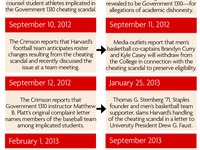
Since resident deans were first made aware of the Gov 1310 cheating scandal in August 2012, the incident has been a central part to many lives at Harvard and affect the athletics teams.
As Jordan sat scrolling through new emails during an informal team meeting in August of last year, one message on the laptop screen stood out.
It was from the Office of the Secretary of the Administrative Board, and about 125 other Harvard students—many of whom had not yet arrived on campus or had graduated that past May—had already or would soon receive emails very much like it. It told them they were being investigated by the Ad Board regarding their work in a government course they had enrolled in the previous spring and instructed them to meet with Ad Board Secretary John “Jay” L. Ellison as soon as possible.
Jordan, a fall varsity athlete who requested a pseudonym to avoid association with the cheating case that would become known as the Government 1310 scandal, was not the only person in the room that day to receive the bad news.
“My face turned pale, and I noticed a lot of other kids on my team looking over at me,” Jordan recalled. “And they had this look on their faces like they knew what was going on.”
It was the beginning of an ordeal that sidelined the co-captains of the men’s basketball team, created significant turnover on several varsity rosters, and, some student-athletes said, changed the way that Harvard athletics are perceived both on campus and further afield.
Multimedia
Today, with many departed athletes now back on campus and with their teams, the spectre of Government 1310 no longer looms in quite the same way over Harvard’s athletic courts and fields. But as members of Harvard’s athletics community try to put the saga behind them, the memory of the scandal remains fresh.
AFTER THE EMAIL
For some students, receiving the dreaded Government 1310 email meant talking to parents, weighing financial considerations, rethinking academic plans, and perhaps preparing to move back home. For many athletes like Jordan, particularly those who compete in the fall, it meant an additional set of calculations—deciding whether to take the field, stay in school but sit on the sidelines, or preemptively take a leave of absence.
Faced with these added burdens, some athletes also received support and advice from members of the Athletic Department.
The day after receiving the Ad Board email, Jordan was called into the Athletic Department to meet with a compliance officer to discuss possible routes forward. In the meeting, the compliance officer urged Jordan not to play with the team in an upcoming organized sporting event. If Jordan played in that event and then was required to withdraw in connection with the scandal, Jordan would lose one of four possible seasons of eligibility, the officer said.
Jordan opted to sit out for a third of the season before receiving a packet detailing the evidence the Ad Board had compiled concerning Jordan’s case. It was only then that Jordan felt informed enough to make a decision about whether to start playing or to withdraw.
But even before that, Jordan and other accused teammates faced the issue of communicating the situation to the rest of the team.
“It was something that we went through as a group,” Jordan remembered. “We addressed the team as a group, we explained the situation as a group. It was really a group thing. Within the next 24 hours, it was really becoming a thing that we realized was not contained to our team.”
As rumors of other classmates being investigated started to swirl in the last days of the summer, Jordan remembers that things were “quieter” than expected. But that silence was short-lived, when, on August 30 of last year, Harvard proactively announced that it had a massive cheating case on its hands.
ATHLETES IN THE SPOTLIGHT
Read more in College News
Ellison, CPD, HUPD Descend on Final Club Parties Saturday












